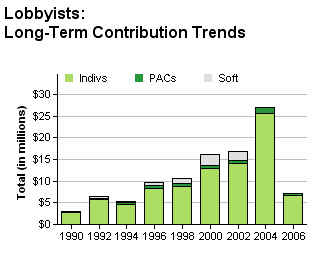Further Campaign Finance Reform Needed

How important are lobbyists to Congressional members? Members from both parties collected $26.8 million for their campaign coffers in 2004. This money was splint 51%-49% between Republicans and Democrats. Every incumbent needs this extra source of campaign money in order to give them an advantage over their challengers.
In a speech to a Washington Rotary Club on Wednesday, Newt Gingerich stated that reform is needed in order to level the playing field for Congressional elections. But he also warned Congressional leaders to refrain from “lobbyist bashing” and focus on changing campaign finance laws to reduce the power of lobbyists. "You can't have a corrupt lobbyist unless you have a corrupt member (of Congress) or a corrupt staff. This was a team effort."
He finished by saying "If they (Republican leaders) intend to retain a majority, then they need to take the lead in saying to the country we need to clean this mess up. "But any effort to push this under the rug, to say this is just one bad apple: That's baloney."
I think he’s right. Looking at the dramatic increase in lobbyist influence over the last 15 years, it is disturbing. In 1990 only $3 million was given by lobbyists. It has increased by more than 8 fold.
Data and Graph Courtesy of the Center for Responsive Politics.
*The figures for 2004 do not include donations of "Levin" funds to state and local party committees. Levin funds were created by the Bipartisan Campaign Reform Act of 2002.
METHODOLOGY: The numbers on are based on contributions of $200 or more from PACs and individuals to federal candidates and from PAC, soft money and individual donors to political parties, as reported to the Federal Election Commission. While election cycles are shown in charts as 1996, 1998, 2000 etc. they actually represent two-year periods. For example, the 2002 election cycle runs from January 1, 2001 to December 31, 2002.
NOTE: Soft money contributions to the national parties were not publicly disclosed until the 1991-92 election cycle, and were banned by the Bipartisan Campaign Finance Reform Act following the 2002 elections.




0 Comments:
Post a Comment
<< Home